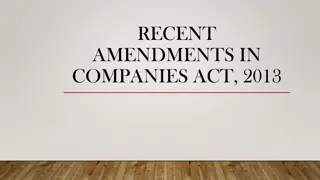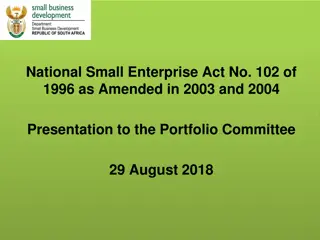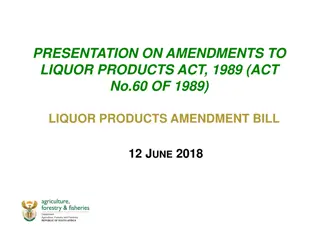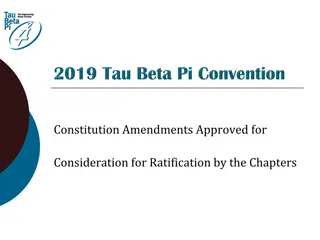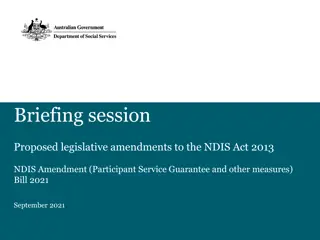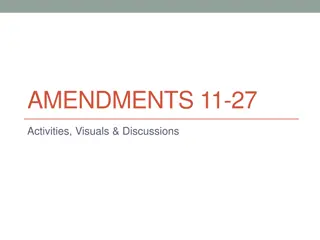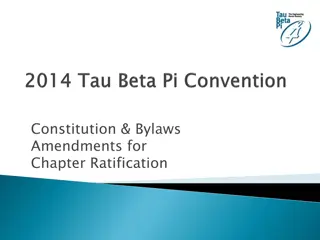Ethics Act Amendments Affecting the OEIG
Revolving Door Prohibition in the State of Illinois for employees involved in contract or regulatory decisions prior to termination, with specific restrictions for C-List and H-List employees. Guidelines for seeking OEIG determination before accepting non-State employment.
Download Presentation

Please find below an Image/Link to download the presentation.
The content on the website is provided AS IS for your information and personal use only. It may not be sold, licensed, or shared on other websites without obtaining consent from the author.If you encounter any issues during the download, it is possible that the publisher has removed the file from their server.
You are allowed to download the files provided on this website for personal or commercial use, subject to the condition that they are used lawfully. All files are the property of their respective owners.
The content on the website is provided AS IS for your information and personal use only. It may not be sold, licensed, or shared on other websites without obtaining consent from the author.
E N D
Presentation Transcript
A charge of murder can be reduced to voluntary manslaughter where the defendant can successfully argue one of the following defences: Diminished responsibility; Loss of control; or Suicide pact Diminished responsibility
Definition of diminished responsibility The defence is set out in s 2 (1) of the Homicide Act 1957 as amended by s 52 of the Corners and Justice Act 2009 The effect of this section is that: A person who kills or is a party to the killing of another is not to be convicted of murder if he was suffering from an abnormality of mental functioning which: (a) Arose from a recognised medical condition, (b) substantially impaired the defendant's ability to Understand the nature of his conduct; or Form a rational judgment; or Exercise self-control and c) Provides an explanation for the defendant's acts omissions in doing or being a party to the killing The burden of proving the defence rests on the defendant, but it only needs to be proven on the balance of probabilities
Abnormality of mental functioning Before s 52 of the Corners and Justice Act 2009 amended the definition of diminished responsibility, the phrase used was abnormality of mind - Byrne (1960) Although Byrne uses the old definition it is very likely that the courts will still use the same standard of abnormality, that is: that the defendant's mental functioning was so different that the reasonable man would find it abnormal the jury will decide this Covers a wide range of situations: Seers (1985) chronic reactive depression. Hobson (1998) battered woman syndrome.
Substantially impaired Byrne (1960) the question of whether the impairment was substantial was one of degree and that it was for the jury to decide Lloyd( 1967) substantial does not mean total Seers (1984) substantially means more than trivial but not total Medical evidence will normally be given at trial which the jury can consider - Campbell (1997). Question will be withdrawn from the jury if there is no evidence of substantial impairment.
What must be substantially impaired? S 2 (1A) of the Homicide Act , the defendant s ability to do one of three things must be substantially impaired: 1. To understand the nature of his conduct 2. To form a rational judgement 3. To exercise self-control - this was the case in Byrne (1960), medical evidence that his condition of being a sexual psychopath meant he was unable to control his perverted desires; the defence of diminished responsibility was therefore available to him. Since the Coroners and Justice Act 2009 there must now be some causal connection between the defendant s abnormality of mental functioning and the killing - s 2 (1B) Homicide Act 1957
Diminished responsibility and intoxication Intoxication alone cannot support a defence of diminished responsibility, Di Duca (1959); Dowds (2012) Where the defendant has a pre-existing mental disorder, intoxication does not prevent him using the defence -If the condition existed before the intoxication it is acceptable even though the intoxication may have made it worse - Dietschmann (2003). Alcohol Dependency Syndrome can be an abnormality of mental functioning Wood (2008)
Reform of the law The Coroners and Justice Act 2009 new definition, using the phrase recognised medical condition , should be more flexible and allow for future developments in the field of medical science. The 2009 Act also now incorporates the decision in Byrne (1960) in that the Act sets out clearly what aspects of the defendant s mental functioning must be substantially impaired in order for the defence to succeed.
Still need for reform? The burden of proof should not be on the defendant, in most other defences once an issue has been raised by the defendant the prosecution has to disprove it Making the defendant prove diminished responsibility could be seen as a breach of Article 6 of the European Convention on Human Rights which states that, everyone charged with a criminal offence shall be presumed to be innocent until proven guilty according to law




